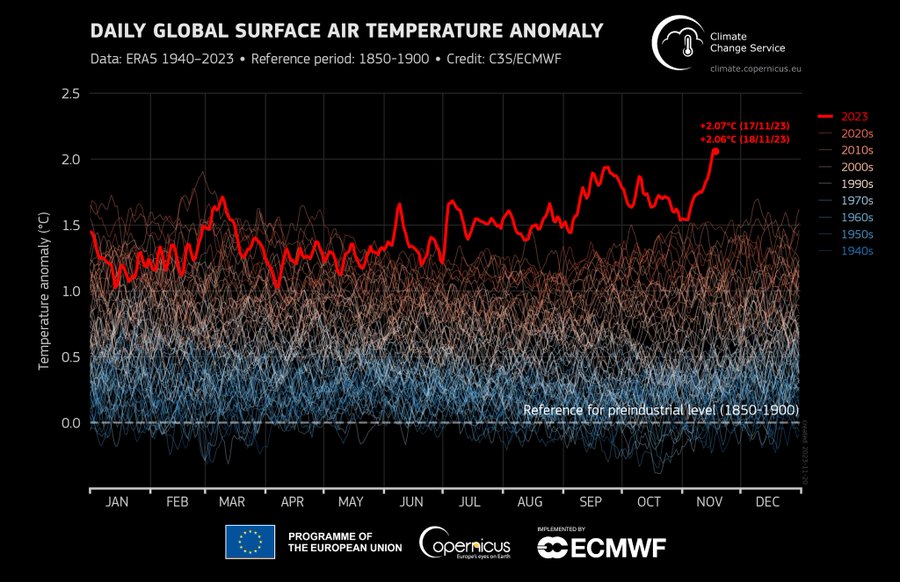Global Temperatures Surpass 2°C Threshold for the First Time in History

In a concerning development late last week, global temperatures briefly surged past a critical benchmark that climate scientists had been dreading. Preliminary data suggests that on Friday, the mean global temperature likely exceeded a crucial threshold of 2°C (3.6°F) above preindustrial levels for the first time recorded.
Dr. Sam Burgess, Deputy Director of the Copernicus Climate Change Service, shared on social media that the provisional ERA5 global temperature for November 17 was the warmest on record, registering at 1.17°C above the 1991-2020 average.
Dr. Burgess emphasized, “Our best estimate is that this was the first day when global temperature was more than 2°C above 1850-1900 (or preindustrial) levels, at 2.06°C.” The provisional data for November 18 also indicated a global average temperature of 2.06°C above preindustrial levels.
Implications of Crossing the 2°C Threshold
There is substantial evidence that consistently surpassing the 2°C mark above preindustrial levels will have severe consequences for the environment and its inhabitants, including humans. In a “2°C world,” the prognosis is grim for over 99 percent of the world’s coral reefs.
Additionally, the world is likely to witness significant declines in insects, 16 percent of plants, and 8 percent of vertebrates, compared to a milder 1.5°C (2.7°F) warming. Moreover, this level of warming could plunge several hundred million people into climate-related poverty.
The 2°C threshold was a pivotal aspect of the 2015 Paris Climate Agreement, in which global leaders committed to keeping global warming “well below 2°C above preindustrial levels “ and intending to limit it to just 1.5°C.

Contextualizing the Data
It is crucial to note that this is provisional data, and the global average temperature only breached the threshold for a day. To comprehensively assess the impact of climate change, it is essential to consider long-term trends spanning years and decades rather than isolated days. Nevertheless, some experts view these record figures as a significant benchmark, far from a one-time occurrence.
This year has witnessed repeated instances of record-breaking temperatures. On July 3, 2023, the world experienced its hottest day since records began, only to be surpassed by temperatures on July 4 that were nearly 1°C (1.8°F) higher than the 1979-2000 average.
Scientists forecast that 2023 will likely set new records for recorded history’s hottest global surface temperatures. Furthermore, if current trajectories persist, record-breaking temperatures are likely in 2024.
A Wake-Up Call for Climate Action
While these elevated global temperatures over the weekend do not necessarily signal the end of the goal to “keep 1.5°C alive,” they should serve as a stark wake-up call. Climate scientists and activists hope decisive action can be taken globally to remain well below the 2°C threshold.
Nonetheless, the recent temperature surge underscores the urgency of addressing climate change to avert potentially catastrophic consequences.
Read the original article on IFL Science.
Read more: Climate Change May Disrupt Future Solar Generation, According to Modeling.










